Why Queen Elizabeth II proved herself to be a ‘rock of stability’ for British Jews
In a 70-year reign the Queen showed a determination to protect the Jews of Britain. Failure to make an official visit to Israel does not tarnish her efforts.
Lee Harpin is the Jewish News's political editor
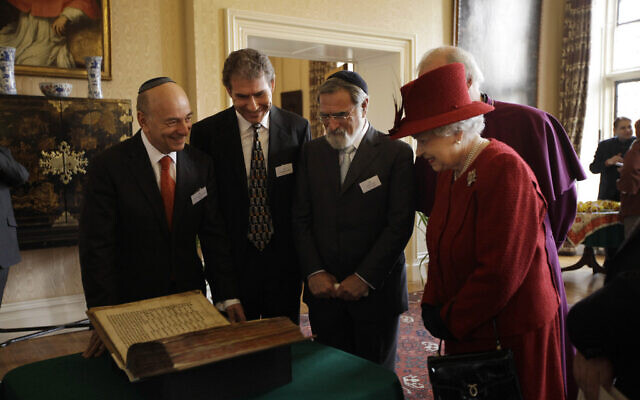
The overwhelming majority of UK Jews adored Queen Elizabeth II. And in return, they believed that throughout her 70-year long reign, the late Her Majesty truly respected the community.
The actual truth, of course, is that we do not truly know what the Queen really thought of Britain’s Jews during her life, because she was such an expert at shielding her views and opinions from wider society.
But by her actions alone, particularly in her role as Defender of the Faith and Supreme Governor of the Church of England, it would be impossible not to conclude that the Queen admired and welcomed those, such as the Jewish people, who held as strong a connection to their faith as she did with hers.
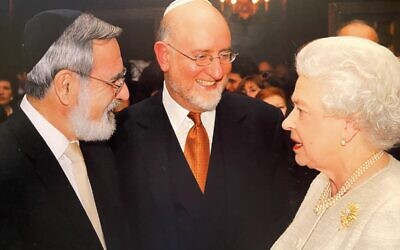
Princess Elizabeth had married Philip Mountbatten at Westminster Abbey on the 20th of November 1947, after first meeting him in 1934. A union that would last 73 years.
The Board of Deputies of British delivered a loyal address to the King George VI offering him, and the couple “respectful congratulations” on the marriage.
The King replied: “The Queen and I are glad to know that Princess Elizabeth’s engagement has given such pleasure to my Jewish subjects.”
It is notable then that in May1952, just several months after the death of her father, King George VI, the Queen met with Board of Deputies President Dr. Abraham Cohen and with Chief Rabbi Israel Brodie and of the Sephardic community in Britain.
The Queen later thanked the Jewish leaders for their messages, both of sympathy at her father’s passing, and best wishes for the start of her reign.
Just one month, the community was again well represented at the Queen’s Coronation ceremony at Westminster Abbey, with Chief Rabbi Brodie, Foreign Undersecretary Lord Reading and Alderman A. Moss, the first Jewish Mayor of the City of Manchester amongst those to attend the celebrations.
Israel’s President Ben Zvi was also represented at the coronation by Ambassador Eliahu Elath.
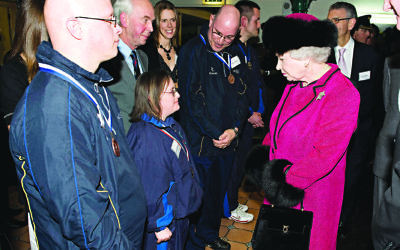
Current Board President Marie van der Zyl – there were 14 of them during Elizabeth II’s reign – had praised the Queen’s “long history of involvement with the Jewish community” in tribute written for her Platinum Jubilee celebrations in June this year.
“Throughout her remarkable reign, the Queen has encouraged harmony and friendship across the many different communities and denominations of this country,” added van der Zyl.
“She also embodies the finest qualities of our country — stability, solidity, reliability and supreme dignity.”
It is also hugely significant that one of the first charities that Her Majesty pledged her support to was the Council of Christians and Jews. (CCJ).
Founded in 1942, at the height of the Second World War and the Holocaust, by Archbishop William Temple and Chief Rabbi Joseph Hertz, the CCJ succeeded as a meeting point for Jewish and Christians to meet, to understand each other better and to create meaningful engagement between the communities.
Current presidents include Chief Rabbi Ephraim Mirvis, the Archbishop of Canterbury Justin Welby, along with leaders from all Jewish religious denominations.
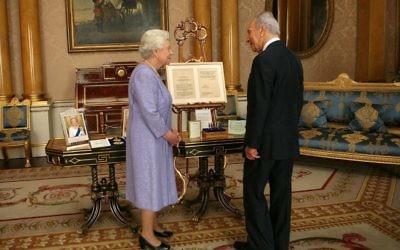
In must be remembered the 1950s were a period of great change for UK society, which became increasingly multi-cultural in its make-up.
But from the very earliest years of her reign, Her Majesty showed her willingness to embrace inter-faith projects such as the CCJ.
The late Lord Chief Rabbi Sacks would observer that such crucial inter-faith work “helped to make tolerance the default option in British life.”
At celebrations for her 90th birthday in 2016, Lord Sacks further stressed the significance of the Queen’s work.
He spoke of her as a monarch ““whose greatness speaks across ethnic and religious divides… Her contribution to British society is immeasurable and the respect she has shown for all religions has enriched our lives.”
In a statement, released after the Queen death last Thursday, the CCJ themselves said the Queen had “conveyed a deep sense of the importance of interfaith relations inspired by her own Christian faith” thorough her commitment to the charity.
At official CCJ functions and through other work for the organisation Her Majesty, they added, had “expressed her personal endorsement of the endeavours to improve relationships between people of different faiths in her diverse kingdom.”
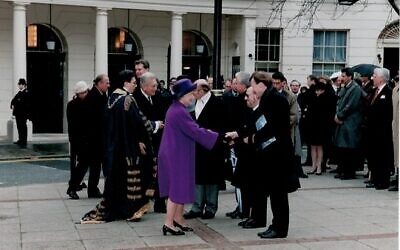
In 1970, as she attended the United Synagogue’s centenary celebrations the Queen responded warmly after being presented with a Hebrew Bible.
The Queen would later hold a Buckingham Palace reception in 2006 to celebrate the 350th anniversary of the resettlement of the Jewish community in this country in 1656, following the 1290 expulsion of the Jews.
In 2012 former Board president Vivan Wineman with Lord Sacks and former Archbishop of Canterbury Rowan Williams, showed the Queen and Prince Philip the Codex Valmadonna, the oldest Jewish manuscript which dates from prior to 1290.
She has also carried out engagements for Norwood, alongside the CCJ, one of the two charities of which she is Patron.
In 1985 Her Majesty attended a reception at London’s Guildhall to mark the 190th anniversary of the charity, set up to help vulnerable children and their families.
Lord Mendelsohn and Lady Mendelsohn CBE, Co-Presidents, and Neville Kahn, Chair of Trustees, Norwood, all told the “sombre” mood at the charity this week following Her Majesty’s death.
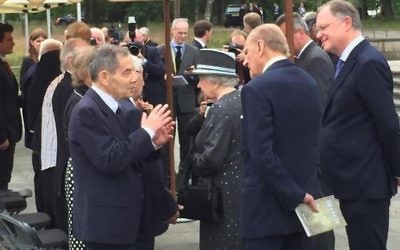
If the Queen’s commitment to the Jews of the UK was unquestionable, her desire to ensure her subjects never forget, and also learn from the horrors of the Nazi Holocaust has also been clear.
The praise Her Majesty received from survivors who escaped Europe as refugees to arrive in this country speaks for itself.
John Hajdu MBE, a survivor from Hungary, spoke of his admiration, both for the Queen and this country at Her Majesty’s Platinum Jubilee tea party in 2012.
He noted how the Queen had been on the throne for just four years when he arrived in the UK in 1957, and the “never in my wildest dreams” did he think he would end up with one of her highest state awards.
Distraught after the Queen’s death was confirmed last week, Ivor Perl, who survived the Auschwitz death camp said it felt like a member of his own family had passed away, such was his admiration for Her Majesty.
“The Queen stood for openness, compassion, a society together,” he added. “This is very important for survivors.”
In 2012, the late Lord Sacks reflected on his experiences meeting the Queen at an event honouring the 60th anniversary of the liberation of Auschwitz.
Meeting with a group of Holocaust survivors at the event, the Queen seemed determined to hear each and every personal story.
“When the time came for her to leave, she stayed. And stayed,” Sacks wrote. “One of her attendants said that he had never known her to linger so long after her scheduled departure.”
Sacks added: “She gave each survivor — it was a large group — her focused, unhurried attention…
“One after another, the survivors came to me in a kind of trance, saying: ‘Sixty years ago I did not know if I would be alive tomorrow, and here I am today talking to the Queen.'”
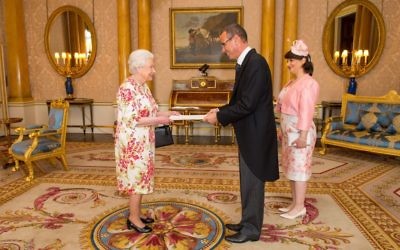
A Patron of the Holocaust Memorial Day Trust since its inception in 2005, she handed over to the honour Prince Charles in 2015.
In 2000, the Queen inaugurated Britain’s first permanent memorial to the Holocaust at the Imperial War Museum.
Throughout such a lengthy reign, it is inevitable there were times where clarity of message sent out to the community was either lacking, or perhaps just misinterpreted.
Questions were asked by Jews in this country, and indeed in Israel, as to why it took five official visits to Germany before Her Majesty visited a Nazi concentration camp.
It was 2015 before she saw for herself the site of Bergen-Belsen camp, where she laid a wreath, met with Holocaust survivors at the site, and was overheard saying: “It must have been horrific.”
Similarly, during an earlier 1996 visit to Poland, some asked why there was no visit to Auschwitz put in on the schedule, although Her Majesty did lay a wreath at a Jewish memorial at Umschlagplatz in Warsaw.
The Queen’s failure to visit Israel, despite being the most travelled monarch in the world, remains the biggest disappointment to many in this country.
Although it must be remembered that no member of the royal family flew to the Jewish state in an official capacity until Prince William lifted the unofficial foreign office boycott in 2018.
Speaking in the House of Lords only last Friday, the Tory peer Lord Stuart Polak suggested that the Princess Royal was in agreement that it was “sad” the deeply religious Queen was not able to visit the Christian sites in Israel during her lifetime.
But concern not to offend Arab states, along with Foreign Office insistence that a settlement between Israel and the Palestinians must be agreed first, seemed to determine that Queen’s actions in the region throughout her reign.
But at home it worth noting that the Queen held a state banquet for President Ezer Weizman at Buckingham Palace in 1997, where she unveiled a monument to Raoul Wallenberg,
In 2008 President Peres was also given an honorary knighthood.

It is perhaps more significant that the new King Charles III visited Israel in 1995 and 2016, as a prince, to attend the funerals of Yitzhak Rabin and Peres, although neither were official royal visits.
After such a glorious reign, some communal commentators have attempted to summarise the Queen’s relationship with UK Jewry as being complex, mainly down to her approach to Israel.
But such an overview is grossly unfair.
Queen Elizabeth II’s glorious reign heralded both a sense of stability and indeed admiration from others for the Jewish population of this country.
As current Chief Rabbi Mirvis concluded, in a personal tribute to the monarch following her death last week: “She was a rock of stability and a champion of timeless values.”

Thank you for helping to make Jewish News the leading source of news and opinion for the UK Jewish community. Today we're asking for your invaluable help to continue putting our community first in everything we do.
For as little as £5 a month you can help sustain the vital work we do in celebrating and standing up for Jewish life in Britain.
Jewish News holds our community together and keeps us connected. Like a synagogue, it’s where people turn to feel part of something bigger. It also proudly shows the rest of Britain the vibrancy and rich culture of modern Jewish life.
You can make a quick and easy one-off or monthly contribution of £5, £10, £20 or any other sum you’re comfortable with.
100% of your donation will help us continue celebrating our community, in all its dynamic diversity...
Engaging
Being a community platform means so much more than producing a newspaper and website. One of our proudest roles is media partnering with our invaluable charities to amplify the outstanding work they do to help us all.
Celebrating
There’s no shortage of oys in the world but Jewish News takes every opportunity to celebrate the joys too, through projects like Night of Heroes, 40 Under 40 and other compelling countdowns that make the community kvell with pride.
Pioneering
In the first collaboration between media outlets from different faiths, Jewish News worked with British Muslim TV and Church Times to produce a list of young activists leading the way on interfaith understanding.
Campaigning
Royal Mail issued a stamp honouring Holocaust hero Sir Nicholas Winton after a Jewish News campaign attracted more than 100,000 backers. Jewish Newsalso produces special editions of the paper highlighting pressing issues including mental health and Holocaust remembrance.
Easy access
In an age when news is readily accessible, Jewish News provides high-quality content free online and offline, removing any financial barriers to connecting people.
Voice of our community to wider society
The Jewish News team regularly appears on TV, radio and on the pages of the national press to comment on stories about the Jewish community. Easy access to the paper on the streets of London also means Jewish News provides an invaluable window into the community for the country at large.
We hope you agree all this is worth preserving.





















